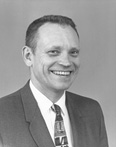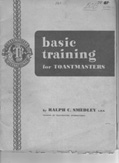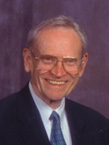 My Icebreaker was on October 3, 1956 to Toastmasters Club 121 in Santa Monica where I had a job managing a few engineers working on heat transfer to missiles. When I would go to my simple staff meeting with a few other managers, my heart would pound every time before I had to make a report, and a friend of my wife’s said I ought to join a Toastmaster Club. This was before women were allowed, and since it was an evening club in a restaurant, it was not uncommon to see communication skills be muddied with a few drinks before the talks. Nevertheless, I completed the required “Basic training” manual of twelve (not ten) speeches, and foolishly decided that being home with my wife and two kids took priority over Toastmasters.
My Icebreaker was on October 3, 1956 to Toastmasters Club 121 in Santa Monica where I had a job managing a few engineers working on heat transfer to missiles. When I would go to my simple staff meeting with a few other managers, my heart would pound every time before I had to make a report, and a friend of my wife’s said I ought to join a Toastmaster Club. This was before women were allowed, and since it was an evening club in a restaurant, it was not uncommon to see communication skills be muddied with a few drinks before the talks. Nevertheless, I completed the required “Basic training” manual of twelve (not ten) speeches, and foolishly decided that being home with my wife and two kids took priority over Toastmasters.
 My Icebreaker was on October 3, 1956 to Toastmasters Club 121 in Santa Monica where I had a job managing a few engineers working on heat transfer to missiles. When I would go to my simple staff meeting with a few other managers, my heart would pound every time before I had to make a report, and a friend of my wife’s said I ought to join a Toastmaster Club. This was before women were allowed, and since it was an evening club in a restaurant, it was not uncommon to see communication skills be muddied with a few drinks before the talks. Nevertheless, I completed the required “Basic training” manual of twelve (not ten) speeches, and foolishly decided that being home with my wife and two kids took priority over Toastmasters.
My Icebreaker was on October 3, 1956 to Toastmasters Club 121 in Santa Monica where I had a job managing a few engineers working on heat transfer to missiles. When I would go to my simple staff meeting with a few other managers, my heart would pound every time before I had to make a report, and a friend of my wife’s said I ought to join a Toastmaster Club. This was before women were allowed, and since it was an evening club in a restaurant, it was not uncommon to see communication skills be muddied with a few drinks before the talks. Nevertheless, I completed the required “Basic training” manual of twelve (not ten) speeches, and foolishly decided that being home with my wife and two kids took priority over Toastmasters.
For the next 20 years I rose steadily in management, and one day I was sent on business to Los Alamos. I was visiting my long-time friend from Cornell, and he encouraged me to join him for lunch at his local club. Although all I did was table topics, as I recall I had more than 20 “ahs.” Mortified, I came home and found that Club 100 met on Tuesday mornings in Santa Ana, and was invited to join. I had the pleasure of knowing long-time member Jerry Browne, and also one member who was nearly 90, who would still sometimes win Best Speaker. I remember wondering if I could do that at 90. The other thing I learned was that the dynamics of Toastmasters had changed with the addition of women in three ways: 1. All the really dirty jokes were gone! 2. When a woman said she would do something, she DID it instead of complaining that her “job got in the way.” 3. I learned that women saw a different world than the one in which I thought I was living. For about three years, I stayed with this great club, starting my Competent Toastmasters Manual all over, until one day my VP boss decided to call staff meetings at the exact time of the club meeting, so I had to quit. My job at that time was to guide the written and oral presentations of a couple of dozen Principal Investigators on Independent Research and Development projects, which were evaluated and scored by the Government. High scores meant more dollars, so everyone was happy when we did well communicating.
Alamos. I was visiting my long-time friend from Cornell, and he encouraged me to join him for lunch at his local club. Although all I did was table topics, as I recall I had more than 20 “ahs.” Mortified, I came home and found that Club 100 met on Tuesday mornings in Santa Ana, and was invited to join. I had the pleasure of knowing long-time member Jerry Browne, and also one member who was nearly 90, who would still sometimes win Best Speaker. I remember wondering if I could do that at 90. The other thing I learned was that the dynamics of Toastmasters had changed with the addition of women in three ways: 1. All the really dirty jokes were gone! 2. When a woman said she would do something, she DID it instead of complaining that her “job got in the way.” 3. I learned that women saw a different world than the one in which I thought I was living. For about three years, I stayed with this great club, starting my Competent Toastmasters Manual all over, until one day my VP boss decided to call staff meetings at the exact time of the club meeting, so I had to quit. My job at that time was to guide the written and oral presentations of a couple of dozen Principal Investigators on Independent Research and Development projects, which were evaluated and scored by the Government. High scores meant more dollars, so everyone was happy when we did well communicating.
My career took me to work on the International Space Station, and I became a mentor to start a new club for the Space Station Project. I was able to sell the management on the importance of Toastmasters in customer communication, and got them to charge any time in excess of the 42 minutes that employees were allowed for lunch to a legitimate training budget. As I recall, our meetings were scheduled for one hour. The Space Station was successful and a president of that club, Norm Cook, went on to become a District Governor in 2004. I also belonged to Astromasters Club 6851 at the same facility that included John Angiolillo, later District Governor in 1999.
Retiring in 1993, I looked around for a club, and happened on Club 231F, (Newport Center Toastmasters) where I was made to feel welcome the second I walked in the door. I was impressed by the fact that every speaker got a video of their speech the next week and that the members all were encouraged to give personal evaluations on pre-printed forms that also included options to vote for “most improved,” “sparkplug” and “risk taker.” Upon retirement, I found that I was busier than ever. I continued to be active in Rotary, joined an Exchange Club to help prevent child abuse, was involved in church management, sang in the choir, and enjoyed my new hobby of authenticating questioned leaked UFO documents. The latter resulted in my making a successful one-hour TV program and my leadership on two Boards of Directors. So, I’m not really “retired” from anything, and get invited to speak from time to time.
Why do I still go to Club 231F each week? The simple answer is that I want to try to excel in everything I do each week, and my Monday morning meeting starts me out on that path. Even today, I can look at a video of my last speech on “Ten things to do to stay young when you’re old” and see how it could have been way better, even though I won first place that day.
Naturally, I’m proud of our Club. We have been a President’s Distinguished Club for many years and both of our contestants won the Division A contest recently. It’s obvious to me that Toastmasters equals Success if you keep at it. It is rare to have a good reason to drop out of Toastmasters. Sign up again!
Appreciatively, Dr. Bob

